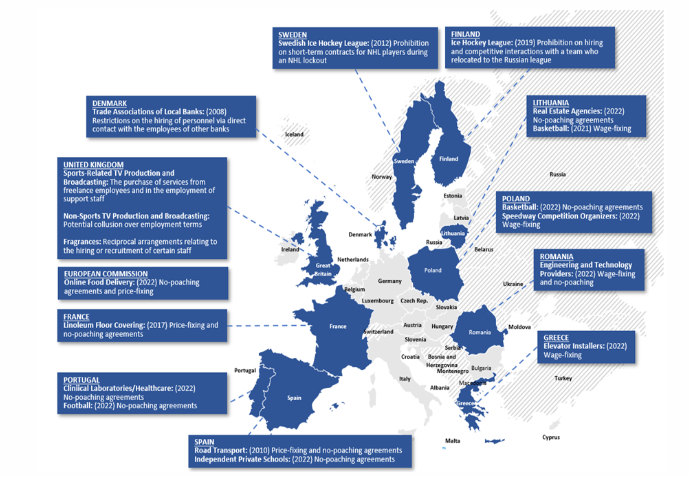Competition authorities in Europe and the United Kingdom are
increasingly focusing in on labor markets in their enforcement
activities. This is part of a wider, global trend in enforcement.
In the United States, the Federal Trade Commission moved to ban
employee non-competes (see our April 2024 Advisory). Even though the law
itself has not changed in Europe and the United Kingdom,
competition authorities have increased their enforcement focus on
employment practices. Moreover, the current UK government proposed
introducing legislation to limit non-competes to three months, and
we will see whether the new UK government will pick up this
proposal after the upcoming election.
Employers and human resources (HR) professionals should therefore
be aware of developments in the rapidly changing competition
enforcement landscape.
What Are the Agencies Interested In?
The idea that collusion on labor can amount to anticompetitive conduct is not new, but historic enforcement cases are sparse. This is changing. New guidance from the European Commission and the UK Competition and Markets Authority (CMA) indicates the three most likely forms of conduct which will trigger their interest are:
1. No-poaching agreements: Where two or more firms agree not to approach or hire one another's employees, either absolutely or without consent.
2. Wage-fixing agreements: Where two or more firms aim to fix employees' pay or equivalent benefits.
3. Information sharing: Where competitors share
commercially sensitive information relevant to
employment, such as standard employment terms or wage levels,
either directly or indirectly. This could also extend to
benchmarking exercises where wage or
other confidential information is exchanged.
Importantly, you don't need a contract or formal
agreement to be caught: For competition law purposes,
an "agreement" does not need to be a written contract. It
can be a verbal exchange, a "gentlemen's agreement,"
or just an understanding. The concept captures very soft
understandings and that is a core area of potential exposure,
particularly in industries where HR professionals from competing
firms meet in special fora or trade bodies. With respect to
information exchanges, simply receiving and giving information can
be enough.
What Are the Key European Union and UK Enforcement Cases?
In January 2024, the CMA expanded the scope of its investigation
of the UK fragrances sector to include "unlawful
coordination ... involving reciprocal arrangements relating to the
hiring or recruitment of certain staff," likely a form of
no-poach agreement. Similarly, the CMA is also currently
considering employment-related issues in parallel investigations
into the sports and non-sports broadcasting sectors. Here, the
CMA's suspicions concern potential coordination regarding both
direct employees and freelance employees from whom services are
purchased, though precise details of the alleged breach have not
been made public.
At the same time, the European Commission conducted dawn raids in
November 2023 to expand the scope of their investigations into the
online food delivery sector to include
potentially (in their view) anticompetitive no-poaching agreements
between competitors.
The following visual shows countries that have actively pursued such cases. This means that any company with a European footprint needs to have in place proper procedures to avoid creating antitrust risk.

Figure 1 - European competition cases relating to labor markets.
In parallel, the UK government released a policy paper
indicating plans to limit non-compete clauses in employment
contracts to a maximum term of three months. This will require a
change in legislation, and, given the UK general election, one
needs to see if the new government takes up this initiative. This
may fall by the wayside, given other pressing demands on the new
government's schedule, but if implemented, such a change may
well be the death knell of non-competes in the UK because it would
rarely be worth the time and expense of going to court to enforce a
restriction of only three months' duration.
The ongoing focus on non-competes and employment terms in the
context of competition was reemphasized in a detailed report on the
topic by the CMA's Microeconomics Unit in January 2024, and the
topic was flagged as an area of ongoing focus in the CMA's
2023-2024 Annual Plan.
Transparency, Benchmarking, and Trade Associations
Anticompetitive collusion between competitors is not limited to
actively agreeing to fix certain employment terms, such as wages or
notice periods. A simple exchange of competitively sensitive
information (e.g., sharing insufficiently aggregated salary data on
a one-time basis) could breach competition law. At the same time,
employers are also under increasing pressure to disclose employment
data, such as salaries, in pursuit of pay transparency. Fulfilling
all statutory duties, therefore, requires that employers walk a
tightrope, fulfilling employment law disclosure requirements
without breaching competition restrictions.
Past examples of competition authorities treating information
exchanges as anticompetitive even if they are not part of a wider
cartel include reciprocal (or unilateral) exchanges of information
without further agreements or understanding as to conduct. Hence,
there is a significant risk that competition authorities will apply
this more actively in the employment sphere.
Moreover, information exchange via independent third parties, such
as a trade association, does not necessarily shield an employer
from antitrust risk if the information is not sufficiently historic
or aggregated. For example, in the Polish basketball case listed
above (see Figure 1), members of the Polish Basketball League
agreed to each withhold pay from players on account of the season
ending early during the COVID-19 pandemic. A system of information
exchange between the teams via a third party, the league itself,
enabled this coordination. Similarly, this could occur via wage
benchmarking efforts through a trade association if data is
insufficiently historic, aggregated, or genericized.
What Does This Mean for Busy HR Professionals?
Protecting against anticompetitive behavior, and subsequent
enforcement actions, presents a complex challenge — all the
more so for HR teams already acting in a highly regulated field.
The risks will be even greater where a company is potentially
dominant in its field and attracts more scrutiny from competition
authorities. The first step in any compliance program is to conduct
up-to-date training and education of staff on competition
restrictions and use internal reporting tools to sensitize HR
professionals to the potential of antitrust risk and familiarize
them with the concepts of competition law. This should ideally be
backed up by internal policies or guidance given by employers to
relevant managers and HR professionals to demonstrate that the
employer is on top of this area and is not encouraging collusion or
unlawful information exchanges.
As an ongoing measure, particular care should be paid when
conducting disclosure or transparency initiatives, where a degree
of information release is required, and to industry initiatives,
such as through trade associations or other third parties. HR
professionals should proactively seek input from their internal or
external lawyers from an early stage when being presented with or
developing such initiatives.
The content of this article is intended to provide a general guide to the subject matter. Specialist advice should be sought about your specific circumstances.



